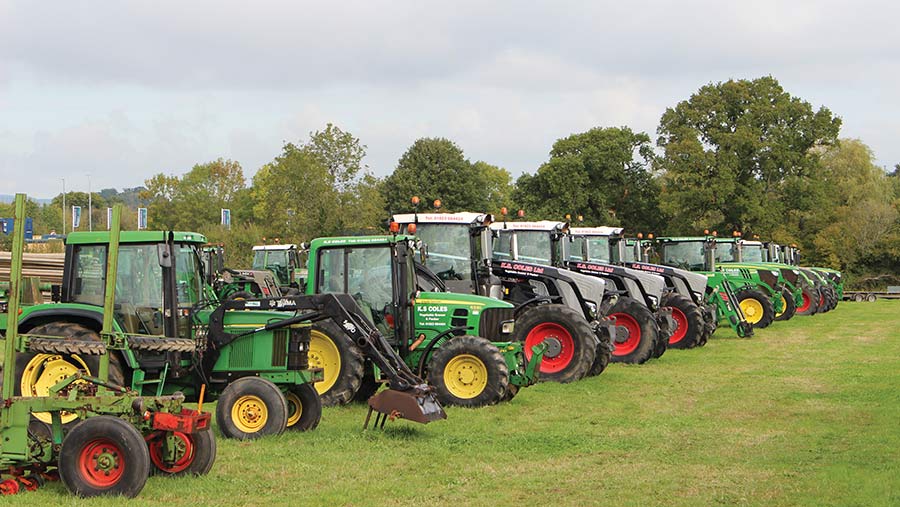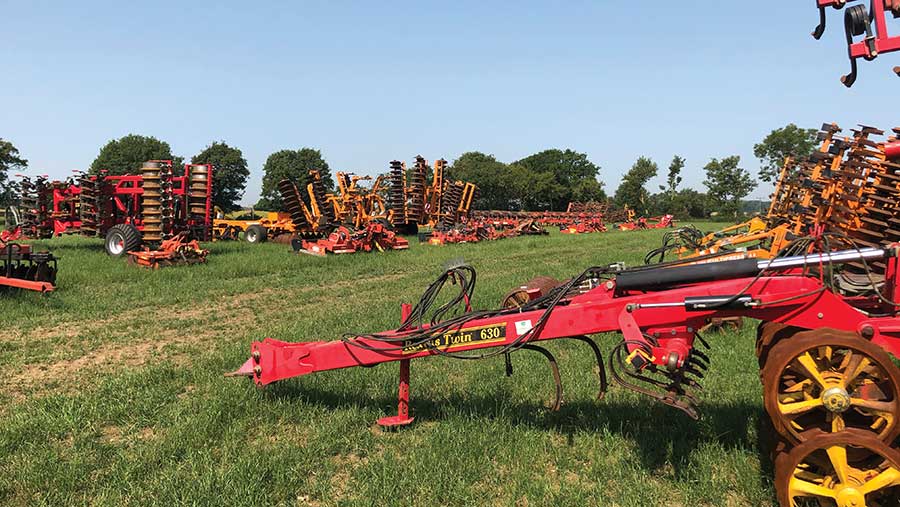Tips for avoiding scams when buying used farm machinery online
 © MAG/Edward Mowbray
© MAG/Edward Mowbray Buying used farm equipment online is convenient and the vast majority of sales involving agricultural machinery and vehicles will be genuine. However, the trade does have a dark underbelly.
While most adverts are authentic, a search of the internet quickly reveals examples of farmers who have ended up thousands of pounds out of pocket when trying to buy kit online after being taken in by cybercriminals.
Scams can be incredibly elaborate, involving fraudsters creating fake websites and often stealing photographs and business details from real farms or companies to make them look even more convincing.
Read more on Legal tips for buying and selling second-hand machinery
According to Rebecca Davidson, rural affairs specialist with NFU Mutual, trade in agricultural vehicles and equipment has become big business for organised criminal gangs that either move kit abroad or sell it online in the UK under seemingly bona fide accounts.
“In some cases, what’s being sold doesn’t even exist and thieves are using the identity of legitimate vehicles to sell online,” she warns.

© MAG/Edward Mowbray
“Others advertise machinery well below market value to try to get a quick sale without the buyer making checks.
“Another popular tactic is putting pressure on potential buyers to pay a deposit to reserve an item that doesn’t exist.”
So what steps can farmers take to confirm that they are dealing with a genuine seller online? Ms Davidson suggests making the following checks before you part with your money:
- If the price seems too good to be true then it probably is – check the market value and find a legitimate reason the price is low before going ahead.
- Ensure the seller has a valid address and telephone number. Visit them at their home or business premises. Be suspicious of anyone offering to meet halfway, at a services or car park.
- Give the vehicle a full inspection and test drive.
- Check important, identifiable features such as serial numbers. Make sure they haven’t been scratched away on trailers or quad bike frames.
- Always check the documentation related to the machinery or vehicle.
- Don’t be rushed into the wrong decision. If you’re unsure, walk away until you have carried out more research and checks.
- Buying from a trusted dealer can help to reduce the risk of being scammed and can also make it easier to get redress or have problems sorted.
The collective auction option
Simon Wearmouth, auctioneer with Brown & Co, which runs quarterly online timed auctions for agricultural machinery, says buying through an auctioneer offers an extra layer of protection when it comes to purchasing kit online.
“In our sales you know you are not bidding for something that might not actually exist, as we’ve been there, seen it and catalogued it,” he says. “So there is not the same degree of risk as [buying off] eBay.” However, he still recommends that buyers arrange an appointment ahead of the auction to see the machine in the flesh and talk to the vendor.

© MAG/Edward Mowbray
“We take lots of photographs, but we can’t take pictures of every bearing. We will also give the best description we can, but the buyer needs to check that it fits that description in their eyes,” he says.
Another advantage is that the buyer pays the money to the client account and this money will not be released to the vendor until after the item has been collected.
“If someone goes to the farm and feels the machine does not match the description, then there is an opportunity to get their money back, which might not be the case if they were doing a farm-to-farm private deal.”
It is important that buyers do seek to pick up their goods promptly, stresses Mr Wearmouth. Under the terms and conditions of Brown & Co’s online sales, a buyer has two weeks to collect their purchase, but they should notify the auctioneer within three days of the sale ending if they are unhappy with it.
They then have seven days in which to get an independent engineer’s report to support their case, although, in most instances, disputes tend to be sorted out informally before this happens.
Legal rights
Alex Forster of Roythornes Solicitors warns that consumers (rather than businesses) are offered the most protection by the law when buying online, but most farm machinery deals will be a business-to-business transaction, which offers less legal protection.
If a consumer buys a tractor online and discovers it is not of satisfactory quality or fit for purpose, they have 30 days to show the fault and reject it. This is called the short-term right to reject.
After 30 days, the consumer can ask the seller to replace or repair the tractor, but loses the short-term right to reject.
If the seller does not repair or replace the goods in a reasonable time, the consumer can reject the goods and claim a full refund.
Where the sale is business to business, there is a right to reject the goods and receive a refund, but only if the buyer is deemed to not have accepted them.
“If a business buys a tractor, collects it and then drives it around for a couple of weeks before it breaks down, it is usually the case they will have lost the right to reject because they have been using the vehicle and therefore have accepted it,” he says.
“However, that doesn’t mean they have no other remedies – it just means they would have to retain the tractor and claim damages for their losses, such as repairs and downtime.”
But he adds that if a buyer inspects a machine before purchasing and the fault is either drawn to the buyer’s attention or something that the inspection ought to reasonably reveal, then the buyer will not be able to reject the goods or bring a claim for damages on the basis that the machine is not of satisfactory quality.
A buyer entering into an online auction is effectively accepting the terms and conditions set down by the auction house. This is the same, regardless of whether the auction takes place in person or online.
Tips for avoiding being caught out
Datatag, which runs the official Cesar security marking and registration scheme, suggests buyers take a number of precautions when purchasing machinery online, including:
Check the photographs
If the advert is accompanied by a photograph, copy it into Google Images and do a search. It is common for criminals to browse the internet for pictures of machines, then use them in the advert.
Make a physical inspection
It is always advisable that buyers make a physical inspection of their intended purchase to help determine its age, condition and value before handing over any money.
View the machinery in daylight and at the seller’s premises, and check that the name and address matches that on any paperwork. Make a discreet note of makes, models and registration numbers of vehicles parked at the address. It may be helpful to the police should you later discover a problem with your purchase.
Look at serial/chassis number
Get the equipment checked by an independent plant/agricultural fitter to ensure it is mechanically sound. Check that the stamped-in serial/chassis number and VIN plate is intact and complete. Make a note of the Cesar number on the triangular label on the machine.
There should be at least two on a machine fitted with Cesar. Call the company on 03450 700 440, give your details to the operator and quote the Cesar number, explaining that you are looking to purchase the machine and you will be given a free “confirm or deny” service regarding any reports on it.

